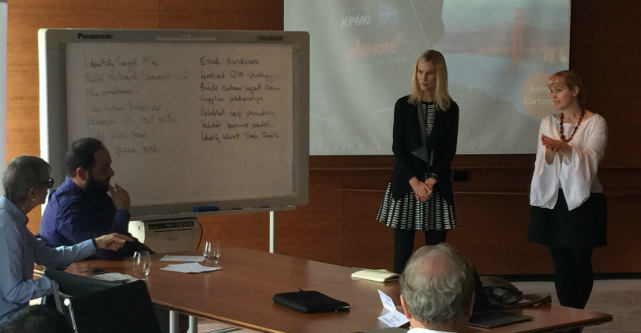
By Ashford Pritchard
Take the leaders from 11 of Australia’s best B2B tech startups. Add a cohort of innovation thought-leaders and industry experts from both Advance and KPMG’s global networks. Sprinkle generously with presentations by some local innovation eco-system superstars like Ryan Liddle, Head of Innovation for Woolworths, and Rick Baker, co-founder of Blackbird Ventures. Heat gradually over three days and season with a pitch-off in front of external judges.
This was the recipe for success for the elevate61 pre-trip workshop, which took place in Sydney recently. Covering everything from enterprise sales to legal and tax implications of moving into the US, the sessions were tailor-made for entrepreneurs and business leaders interested in taking on the American market.
There are useful lessons for any entrepreneur planning to grow a business in a new market. Here are my top five picks:
1. Mentality matters: Be ready to change
The workshops kicked off with a strong message from Viki Forrest, CEO of ANZA Technology Network, who came from her home base in Silicon Valley to facilitate the workshops.
She says if you want to make it in a new market, you need to adapt and evolve your thinking. Small markets such as Australia have their own set of characteristics, from the pace of business to how you sell to your customers.
The first step to success in a new market is to understand yourself and how you’ll need to change to engage with the big three targets – customers, partners and investors.
2. Bring your A-game, because your competition will
In Australia, it is possible to build a solid $10-20 million startup without having to worry too much about direct competition. In the US however, it is likely that there are multiple startups competing to win the same customers as you.
Large markets are invariably more cut-throat – an environment where only the strongest and best survive. Those niggling things that you can afford to let lapse at home can be the difference between winning or losing in new markets.
3. It’s all about research, research, research
Before you go to a new market, you need to know the players.
Another facilitator of the workshop, Remo Carbone, founder of ianden (and an Adelaide native living in New York), shared some important research steps. First, get your hands on the marketing collateral and any public demos of your competitors’ products, then understand how they engage and ‘onboard’ their clients.
Often, a client or prospect who has used the competition can be a great source of research information.
4. More opportunities does not mean it’s easier
One recurring theme covered by speakers (including Blackbird Ventures’ Rick Baker and Bluecats’ Rob Rattray) was when looking at a bigger market, you need to understand that it is not going to be easier to achieve your goals there.
Take investment capital as an example. Due to a relatively small venture capital market in Australia, many local successful startup founders are under the impression that it will be as easy to raise capital in Silicon Valley.
This is just not the case; and in fact having an overseas product or company can be a major barrier, regardless of any traction that has already been achieved in a home market.
5. Note to founders: Don’t lose yourself from the equation
One thing that many founders forget in their focus on their business is to take care of themselves. This is particularly a problem when taking on the massive challenge of international expansion.
Simon Thorp, a tax partner at KPMG, brought this home when he reminded the elevate61 founders to keep in mind their personal, as well as their business tax obligations. Anyone who spends 183 days or more in the US during a calendar year is treated as a US tax resident; which has widespread implications that could cover all your assets no matter where in the world they are located.
It’s the unexpected things that can have a major impact – so make sure to think of yourself as well as your business.
This article originally appeared on the KPMG Newsroom.
Ashford Pritchard is the communications manager, innovation and entrepreneurship at KPMG.
Follow StartupSmart on Facebook, Twitter,LinkedIn and SoundCloud.


COMMENTS
SmartCompany is committed to hosting lively discussions. Help us keep the conversation useful, interesting and welcoming. We aim to publish comments quickly in the interest of promoting robust conversation, but we’re a small team and we deploy filters to protect against legal risk. Occasionally your comment may be held up while it is being reviewed, but we’re working as fast as we can to keep the conversation rolling.
The SmartCompany comment section is members-only content. Please subscribe to leave a comment.
The SmartCompany comment section is members-only content. Please login to leave a comment.